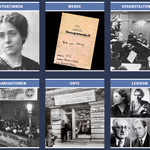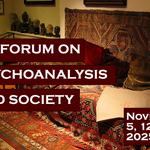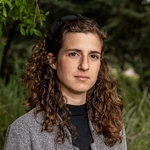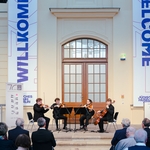Library: A Sermon Heard from Berlin to Philadelphia

- Author
- David Brown
- Date
- Fri, Nov 1, 2013
Among a trio of rare pamphlets associated with Moses Mendelssohn and the Berlin Enlightenment that LBI recently acquired is a remarkable sermon celebrating a Prussian victory in the Seven Years’ War.
December 8, 1757. It was the second day of Hanukkah when the news reached Berlin that the Prussian forces under Frederick II had routed a numerically superior Austrian force in Leuthen three days earlier, thus winning control over Silesia.
On the following Sabbath, the local Jews gathered in the synagogue on Heidereuthergasse to hear Chief Rabbi David Fränckel deliver a sermon whose title leaves little doubt as to its sentiment: A thanksgiving sermon, for the important and astonishing victory obtain’d on the fifth of December, 1757. By The glorious King of Prussia, over the united, and far superior forces of Dr. Felix Pinkus (r.) pictured with a patient and medical colleagues in 1897 the Austrians in Silesia. The victory was a miracle, wrought by the wisdom of the King but providentially ordained by the creator, the Rabbi preached.
The Jewish community in Frederick II’s Berlin was small and subject to onerous taxes and restrictions on everything from marriage to the birth of children. Frederick II was considered an “enlightened” proponent of religious tolerance, but he adopted his predecessors’ policies aimed at economically exploiting the Jews while containing their numbers.
Those Jews permitted to live in the Prussian capital, were nevertheless relatively prosperous, and many among them were inspired by a radical idea percolating among a group of Jewish enlightenment thinkers known as the Maskilim—that Jews could gain the civil rights afforded to other loyal subjects of the crown, participate in the larger German culture, and retain their faith and traditions.
Fränckel’s sermon was, as historian Marc Saperstein has described it, part of an emerging genre in Jewish homiletics— the public expression of mourning or celebration by Jews for events of national importance as part of the larger body politic. Though only a tiny fraction of Jews living in Berlin could claim anything resembling citizenship in the Prussian state, Fränckel describes loyalty to the King, especially as expressed through benevolence for the poor—in particular war widows and orphans—as an obligation for Jews. He also grapples with the moral and philosophical questions of war: “We are all children of the one living God. They who declare themselves our Enemies are equally the work of his Hands, and love and fear him; and we should love them, were they not seduced by perverse Passions to disturb the Tranquility of our dear sovereign.”
Just as the sermon’s themes ranged beyond the traditional concerns of Jewish preaching, its intended audience was far larger than the benches of the Heidereutergasse synagogue could accommodate. The sermon was rendered into German from Fränckel’s Hebrew by his own most brilliant student, the 28-yearold Moses Mendelssohn.* The most gifted Jewish literary stylist in (and advocate for) High German at a time when it was replacing “Judeo-German” as the Jewish vernacular, Mendelssohn would later become the foremost among the Maskilim.
The sermon was an international best-seller; it was reprinted in Germany three times within a year, published in English in London in 1758, and even found its way to the American colonies.
In fact, the (Christian) publisher’s preface to the 1763 edition printed in Philadelphia deals most explicitly with the reasons this text struck such a chord. It addressed how Jews might fit into the emerging modern society if tolerance became a reality: “They have patriot[ic] sentiments, and the warmest gratitude to princes who have wisdom and humanity to protect and defend them.” Although this hardly described the reality of Frederick II’s Prussia, an international discussion about the prospects for Jewish emancipation was underway.
*Although Mendelssohn’s name never appeared on the contemporary editions of the sermon, scholars assumed until very recently that Mendelssohn had effectively ghostwritten it for Fränckel. New scholarship by Gad Freudenthal demonstrates that Fränckel was the author of the sermon.
Literature:
Altmann, Alexander. Moses Mendelssohn: a biographical study. Tuscaloosa: University of Alabama Press, 1973. 67 et seq.
Breuer, Mordechai, and Michael Graetz. German-Jewish history in modern times / Vol. 1, Tradition and Enlightenment, 1600–1780. New York: Columbia University Press, 1996. 281 et seq.
Freudenthal, Gad. “Rabbi David Fränckel, Moses Mendelssohn, and the beginning of the Berlin Haskalah: Reattributing a Patriotic Sermon (1757).” European Journal of Jewish Studies 1, no. 1 (2007): 1-33.
Saperstein, Marc. Jewish preaching in times of war, 1800–2001. Oxford: Littman Library of Jewish Civilization, 2008. 64.





